
ResuLLMe
Enhance your résumé with Large Language Models
Stars: 344
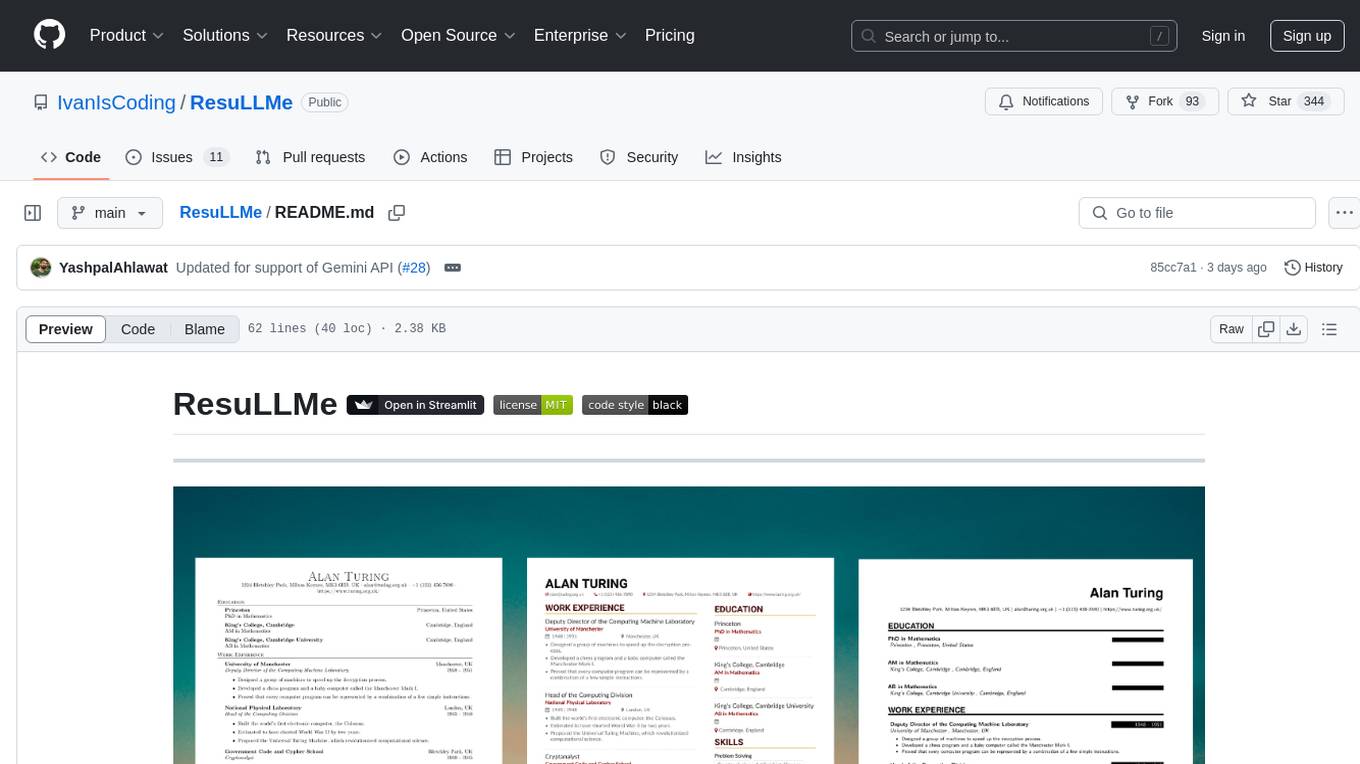
ResuLLMe is a prototype tool that uses Large Language Models (LLMs) to enhance résumés by tailoring them to help candidates avoid common mistakes while applying for jobs. It acts as a smart career advisor to check and improve résumés. The tool supports both OpenAI and Gemini, providing users with smarter, more accurate career guidance. Users can upload their CV as a PDF or Word Document, and ResuLLMe uses LLMs to improve the résumé following published guidelines, convert it to a JSON Resume format, and render it using LaTeX to generate an enhanced PDF resume.
README:
👉 Check some sample résumés generated by ResuLLMe (1, 2, 3)
ResuLLMe is a prototype that uses Large Language Models (LLMs) to tailor résumés. It's goal is to enhance résumés to help candidates avoid common mistakes that occur while applying for jobs. It is like a smart career advisor to check your résumé.
You can use ResuLLMe live at https://resullme.streamlit.app/.
ResuLLMe now supports both OpenAI and Gemini, empowering the application to enhance résumés with even more powerful and diverse language models, providing users with smarter, more accurate career guidance.
ResuLLMe receives your previous CV as a PDF or Word Document. Then, it uses LLMs to:
- Improve the résumé following published résumé guidelines by well-reputed schools
- Convert the résumés to a JSON Resume format
- Render the JSON resume using LaTeX to generate a new PDF of the enhanced resume
To run ResuLLMe locally, the simplest way is to use Docker:
docker-compose up -d
This will make the app avaialable at https://localhost:8501/
To run the app without Docker, you will need to install two things for the app to work. The first item is to install the Python dependencies:
pip install -r requirements.txt
The second item is to install the LaTeX packages:
xargs sudo apt install -y < packages.txt
Lastly, to run ResuLLMe locally, execute:
streamlit run src/Main.py
ResuLLMe is an open source project.
If you want to contribute, open a Pull requests. All contributions are welcome, but some that would particularly be useful to the community are:
- Fixes in existing LaTeX templates
- Adding new LaTeX templates
- Improved prompts
- Support for other LLMs (e.g. Bard, Claude, LLaMA)
For Tasks:
Click tags to check more tools for each tasksFor Jobs:
Alternative AI tools for ResuLLMe
Similar Open Source Tools

ResuLLMe
ResuLLMe is a prototype tool that uses Large Language Models (LLMs) to enhance résumés by tailoring them to help candidates avoid common mistakes while applying for jobs. It acts as a smart career advisor to check and improve résumés. The tool supports both OpenAI and Gemini, providing users with smarter, more accurate career guidance. Users can upload their CV as a PDF or Word Document, and ResuLLMe uses LLMs to improve the résumé following published guidelines, convert it to a JSON Resume format, and render it using LaTeX to generate an enhanced PDF resume.
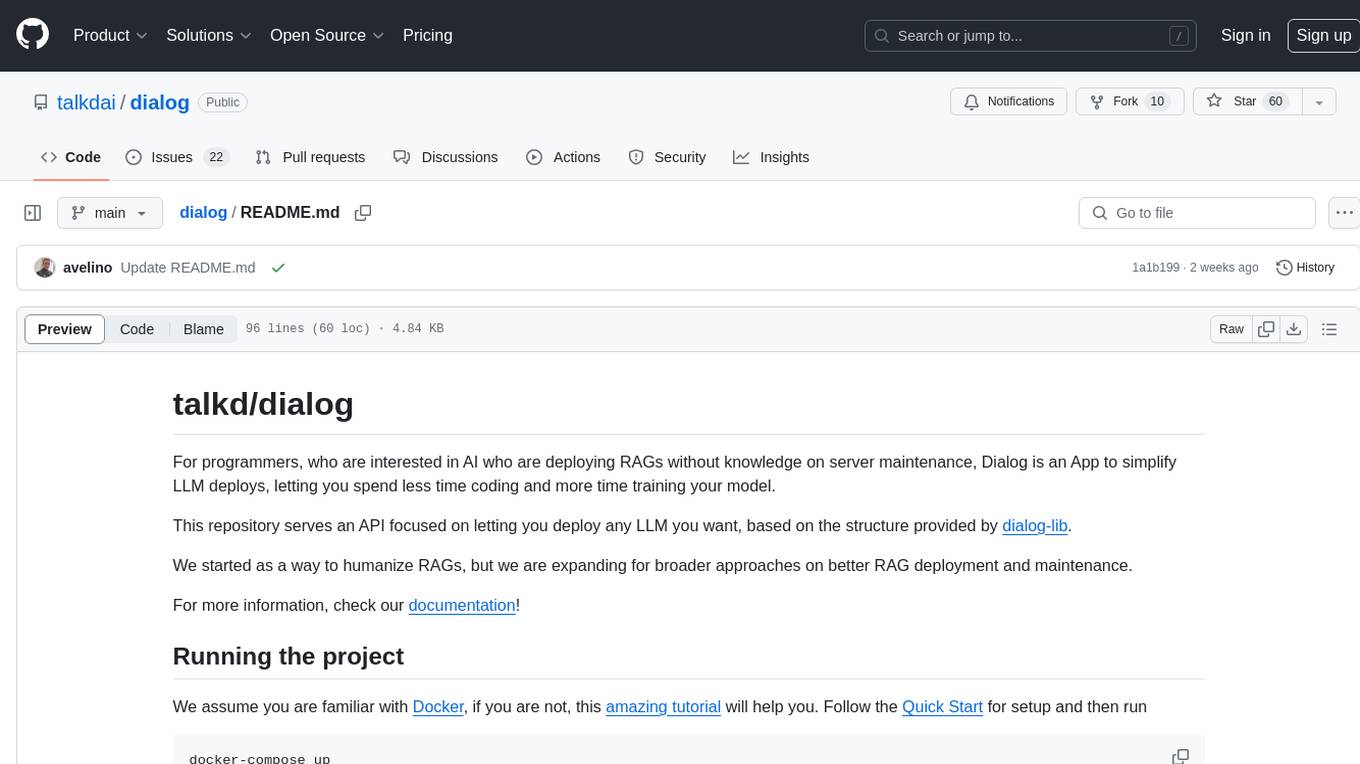
dialog
Dialog is an API-focused tool designed to simplify the deployment of Large Language Models (LLMs) for programmers interested in AI. It allows users to deploy any LLM based on the structure provided by dialog-lib, enabling them to spend less time coding and more time training their models. The tool aims to humanize Retrieval-Augmented Generative Models (RAGs) and offers features for better RAG deployment and maintenance. Dialog requires a knowledge base in CSV format and a prompt configuration in TOML format to function effectively. It provides functionalities for loading data into the database, processing conversations, and connecting to the LLM, with options to customize prompts and parameters. The tool also requires specific environment variables for setup and configuration.

lumigator
Lumigator is an open-source platform developed by Mozilla.ai to help users select the most suitable language model for their specific needs. It supports the evaluation of summarization tasks using sequence-to-sequence models such as BART and BERT, as well as causal models like GPT and Mistral. The platform aims to make model selection transparent, efficient, and empowering by providing a framework for comparing LLMs using task-specific metrics to evaluate how well a model fits a project's needs. Lumigator is in the early stages of development and plans to expand support to additional machine learning tasks and use cases in the future.
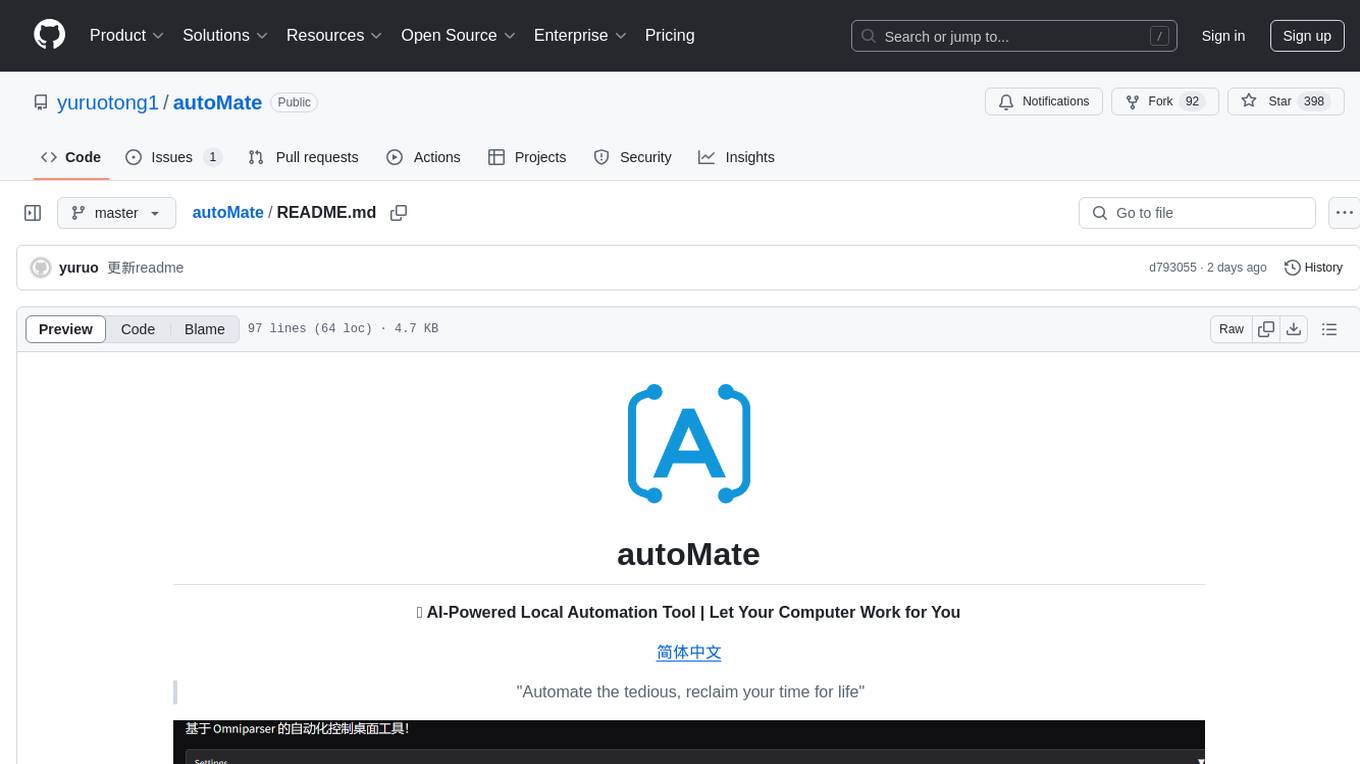
autoMate
autoMate is an AI-powered local automation tool designed to help users automate repetitive tasks and reclaim their time. It leverages AI and RPA technology to operate computer interfaces, understand screen content, make autonomous decisions, and support local deployment for data security. With natural language task descriptions, users can easily automate complex workflows without the need for programming knowledge. The tool aims to transform work by freeing users from mundane activities and allowing them to focus on tasks that truly create value, enhancing efficiency and liberating creativity.
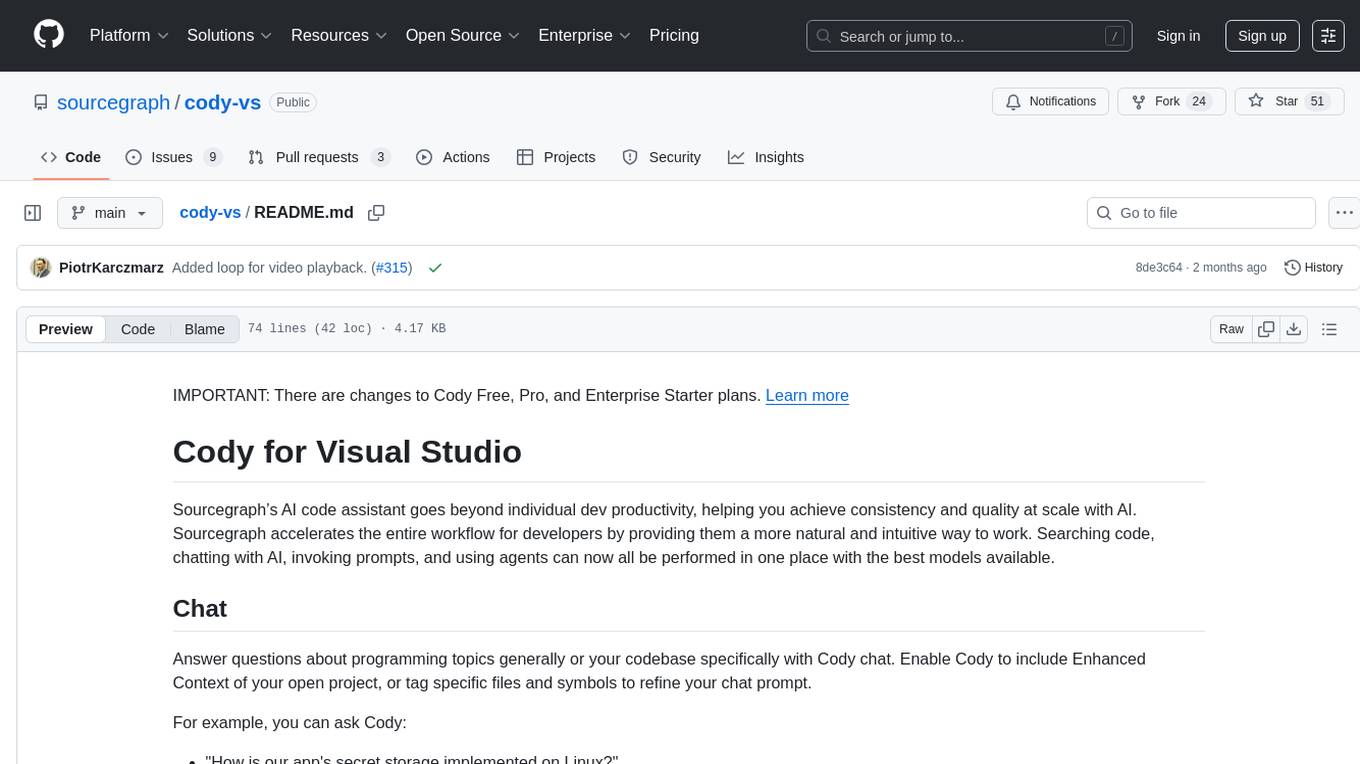
cody-vs
Sourcegraph’s AI code assistant, Cody for Visual Studio, enhances developer productivity by providing a natural and intuitive way to work. It offers features like chat, auto-edit, prompts, and works with various IDEs. Cody focuses on team productivity, offering whole codebase context and shared prompts for consistency. Users can choose from different LLM models like Claude, Gemini Pro, and OpenAI's GPT. Engineered for enterprise use, Cody supports flexible deployment and enterprise security. Suitable for any programming language, Cody excels with Python, Go, JavaScript, and TypeScript code.
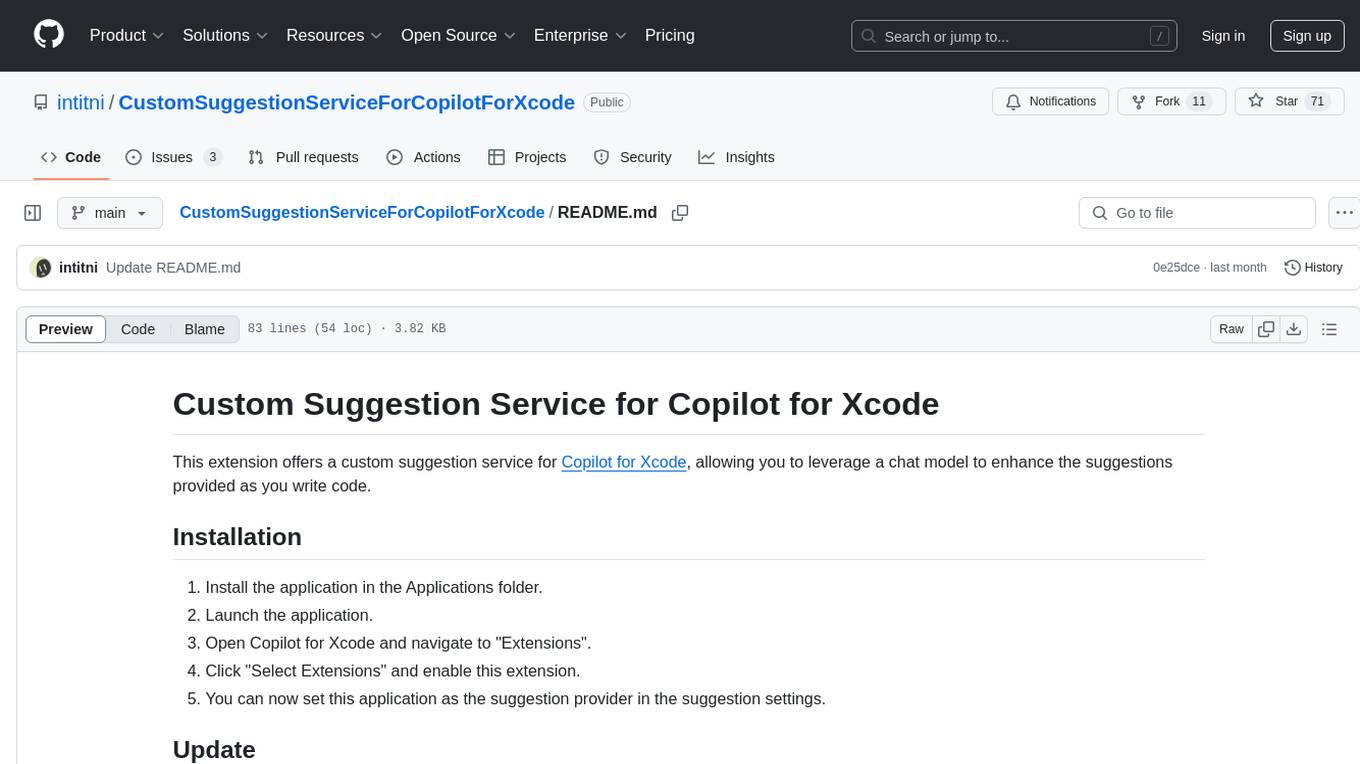
CustomSuggestionServiceForCopilotForXcode
This repository provides a custom suggestion service for Copilot for Xcode, allowing users to enhance code suggestions using chat models. It supports different suggestion services and strategies for generating code suggestions. Users can customize prompt formats and utilize local models for code completion.
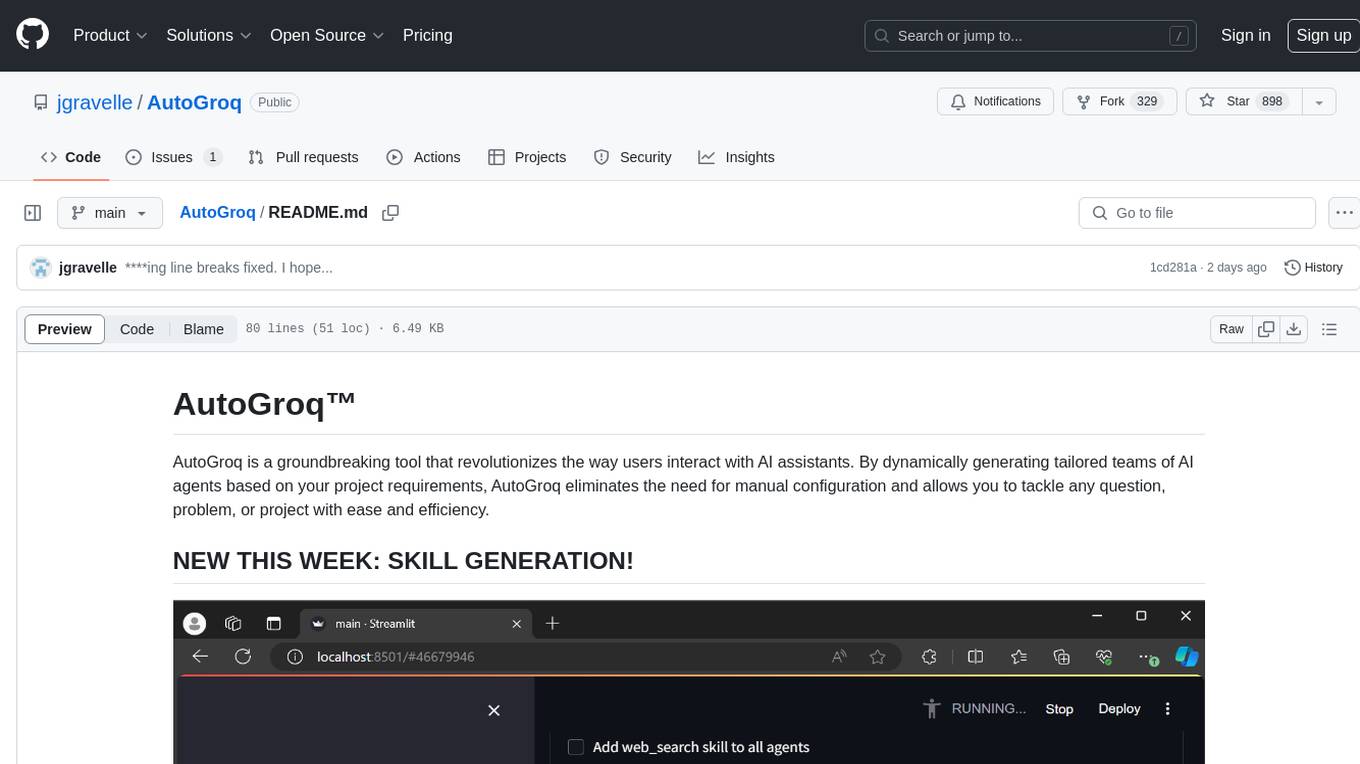
AutoGroq
AutoGroq is a revolutionary tool that dynamically generates tailored teams of AI agents based on project requirements, eliminating manual configuration. It enables users to effortlessly tackle questions, problems, and projects by creating expert agents, workflows, and skillsets with ease and efficiency. With features like natural conversation flow, code snippet extraction, and support for multiple language models, AutoGroq offers a seamless and intuitive AI assistant experience for developers and users.
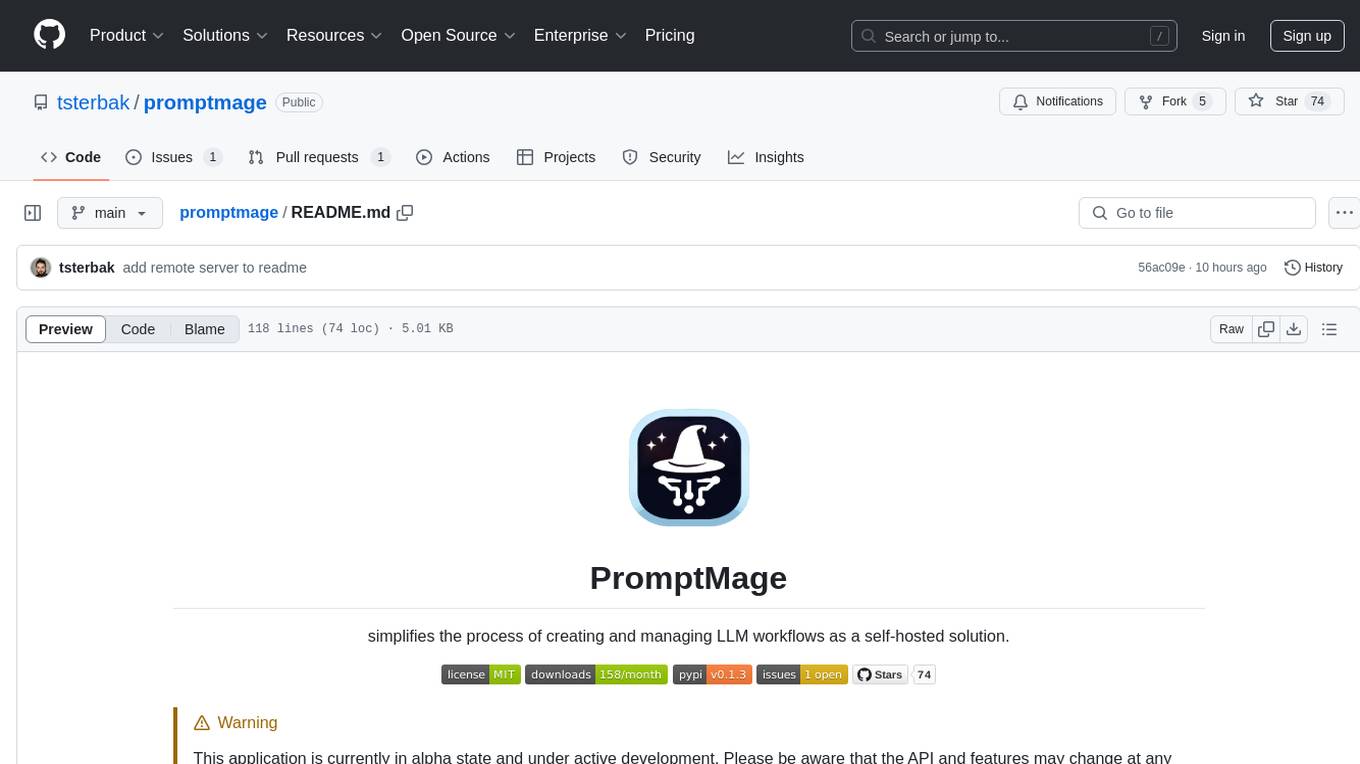
promptmage
PromptMage simplifies the process of creating and managing LLM workflows as a self-hosted solution. It offers an intuitive interface for prompt testing and comparison, incorporates version control features, and aims to improve productivity in both small teams and large enterprises. The tool bridges the gap in LLM workflow management, empowering developers, researchers, and organizations to make LLM technology more accessible and manageable for the next wave of AI innovations.

atomic_agents
Atomic Agents is a modular and extensible framework designed for creating powerful applications. It follows the principles of Atomic Design, emphasizing small and single-purpose components. Leveraging Pydantic for data validation and serialization, the framework offers a set of tools and agents that can be combined to build AI applications. It depends on the Instructor package and supports various APIs like OpenAI, Cohere, Anthropic, and Gemini. Atomic Agents is suitable for developers looking to create AI agents with a focus on modularity and flexibility.

morphik-core
Morphik is an AI-native toolset designed to help developers integrate context into their AI applications by providing tools to store, represent, and search unstructured data. It offers features such as multimodal search, fast metadata extraction, and integrations with existing tools. Morphik aims to address the challenges of traditional AI approaches that struggle with visually rich documents and provide a more comprehensive solution for understanding and processing complex data.
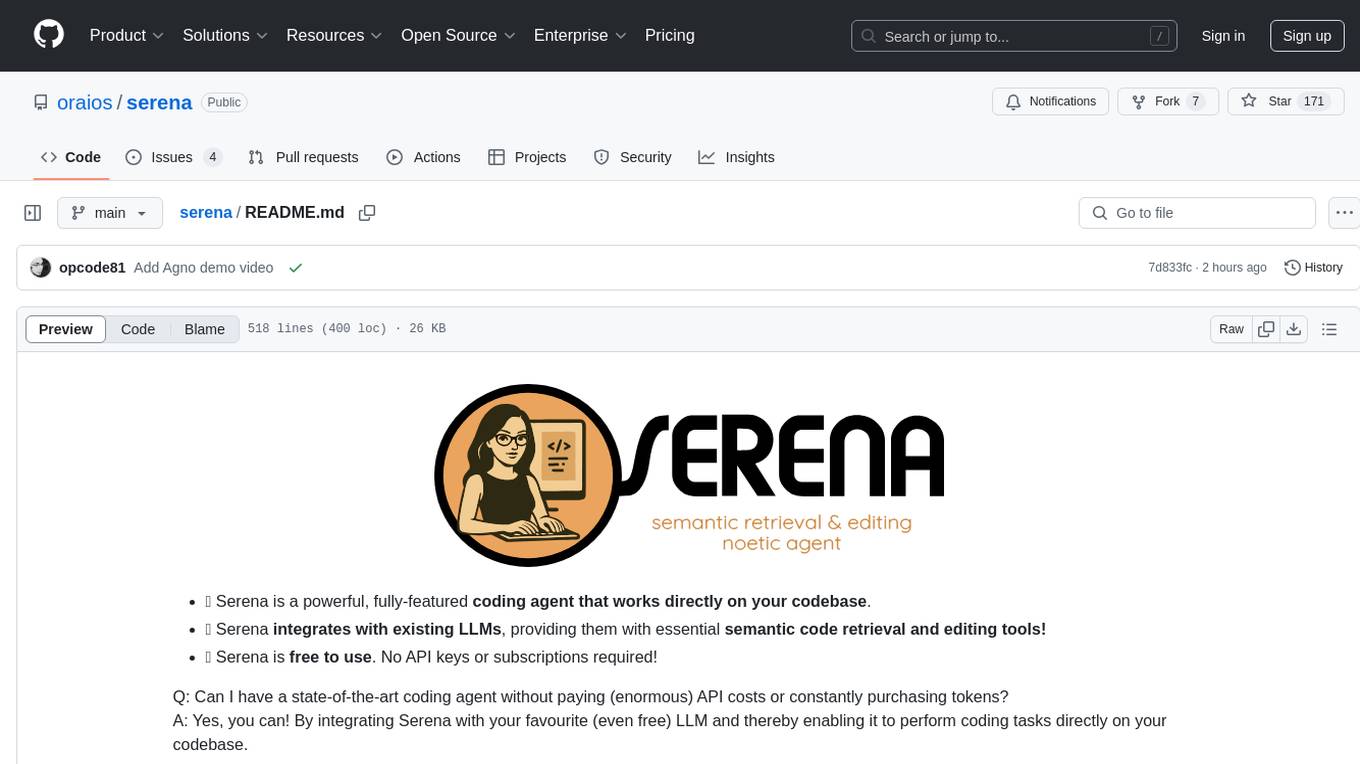
serena
Serena is a powerful coding agent that integrates with existing LLMs to provide essential semantic code retrieval and editing tools. It is free to use and does not require API keys or subscriptions. Serena can be used for coding tasks such as analyzing, planning, and editing code directly on your codebase. It supports various programming languages and offers semantic code analysis capabilities through language servers. Serena can be integrated with different LLMs using the model context protocol (MCP) or Agno framework. The tool provides a range of functionalities for code retrieval, editing, and execution, making it a versatile coding assistant for developers.

lollms-webui
LoLLMs WebUI (Lord of Large Language Multimodal Systems: One tool to rule them all) is a user-friendly interface to access and utilize various LLM (Large Language Models) and other AI models for a wide range of tasks. With over 500 AI expert conditionings across diverse domains and more than 2500 fine tuned models over multiple domains, LoLLMs WebUI provides an immediate resource for any problem, from car repair to coding assistance, legal matters, medical diagnosis, entertainment, and more. The easy-to-use UI with light and dark mode options, integration with GitHub repository, support for different personalities, and features like thumb up/down rating, copy, edit, and remove messages, local database storage, search, export, and delete multiple discussions, make LoLLMs WebUI a powerful and versatile tool.
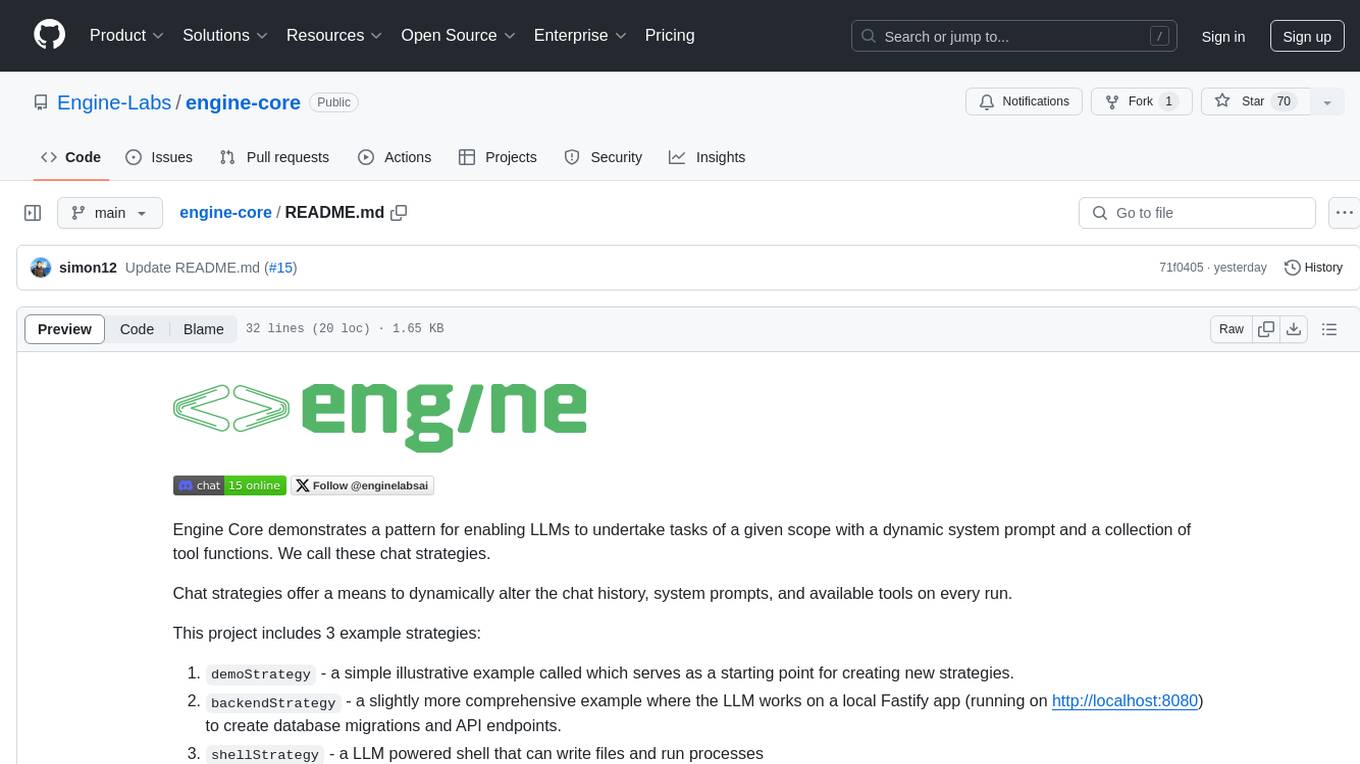
engine-core
Engine Core is a project that demonstrates a pattern for enabling Large Language Models (LLMs) to undertake tasks with a dynamic system prompt and a collection of tool functions known as chat strategies. These strategies allow for the dynamic alteration of chat history, system prompts, and available tools on every run. The project includes example strategies such as demoStrategy, backendStrategy, and shellStrategy. Additionally, LLM integrations like Anthropic or OpenAI have been extracted into adapters to enable running the same app code and strategies while switching foundation models.
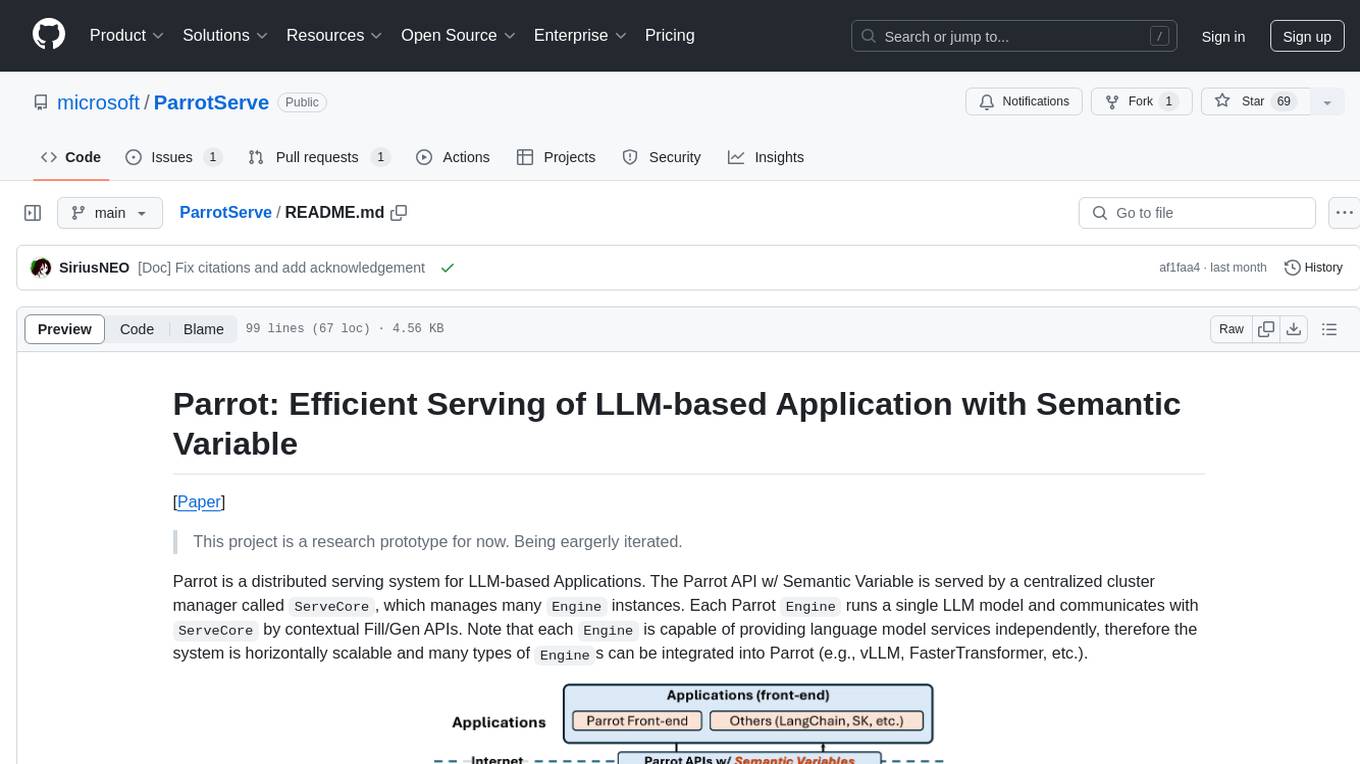
ParrotServe
Parrot is a distributed serving system for LLM-based Applications, designed to efficiently serve LLM-based applications by adding Semantic Variable in the OpenAI-style API. It allows for horizontal scalability with multiple Engine instances running LLM models communicating with ServeCore. The system enables AI agents to interact with LLMs via natural language prompts for collaborative tasks.
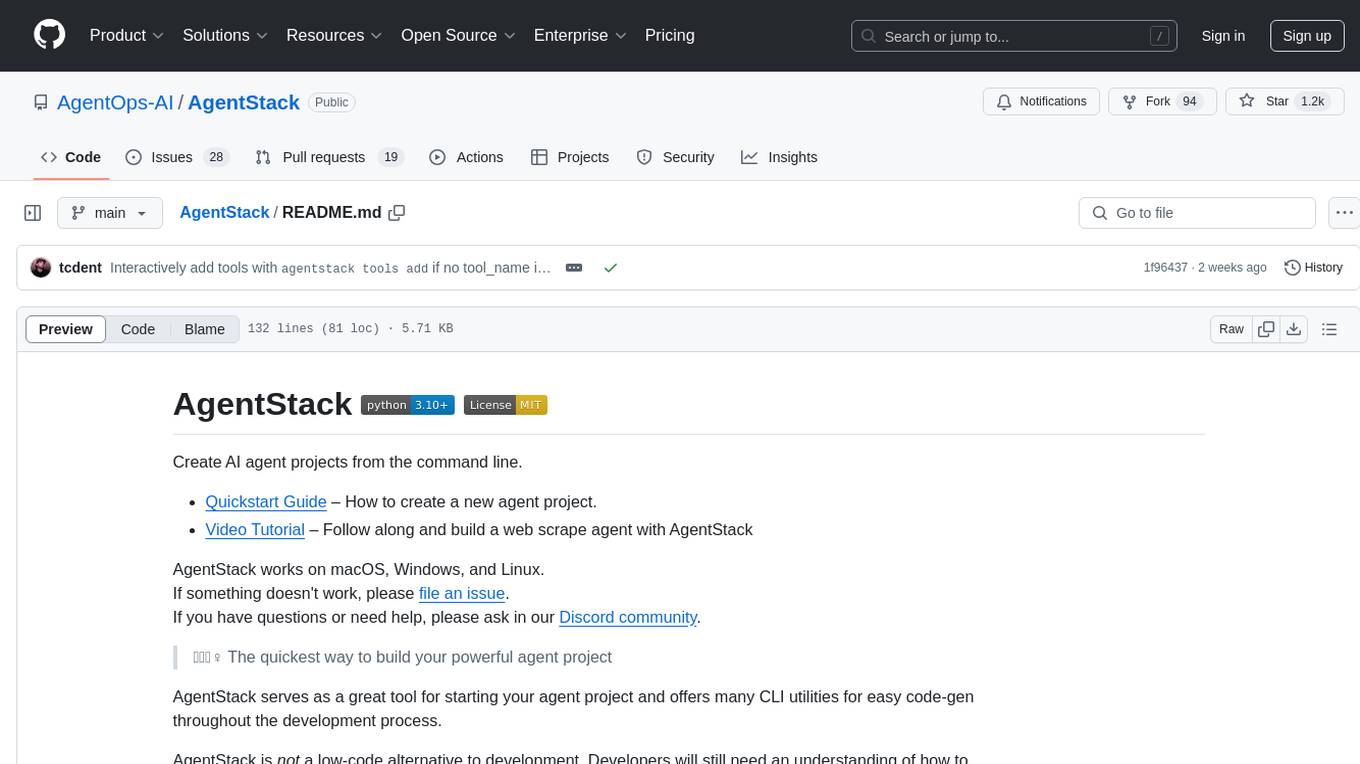
AgentStack
AgentStack is a command-line tool that helps users create AI agent projects quickly and efficiently. It offers CLI utilities for code generation and simplifies the process of building agents and tasks. The tool is designed to work on macOS, Windows, and Linux, providing a seamless experience for developers. AgentStack aims to streamline the development process by offering pre-built templates, easy access to tools, and a curated experience on top of popular agent frameworks and LLM providers. It is not a low-code solution but rather a head-start for starting agent projects from scratch.
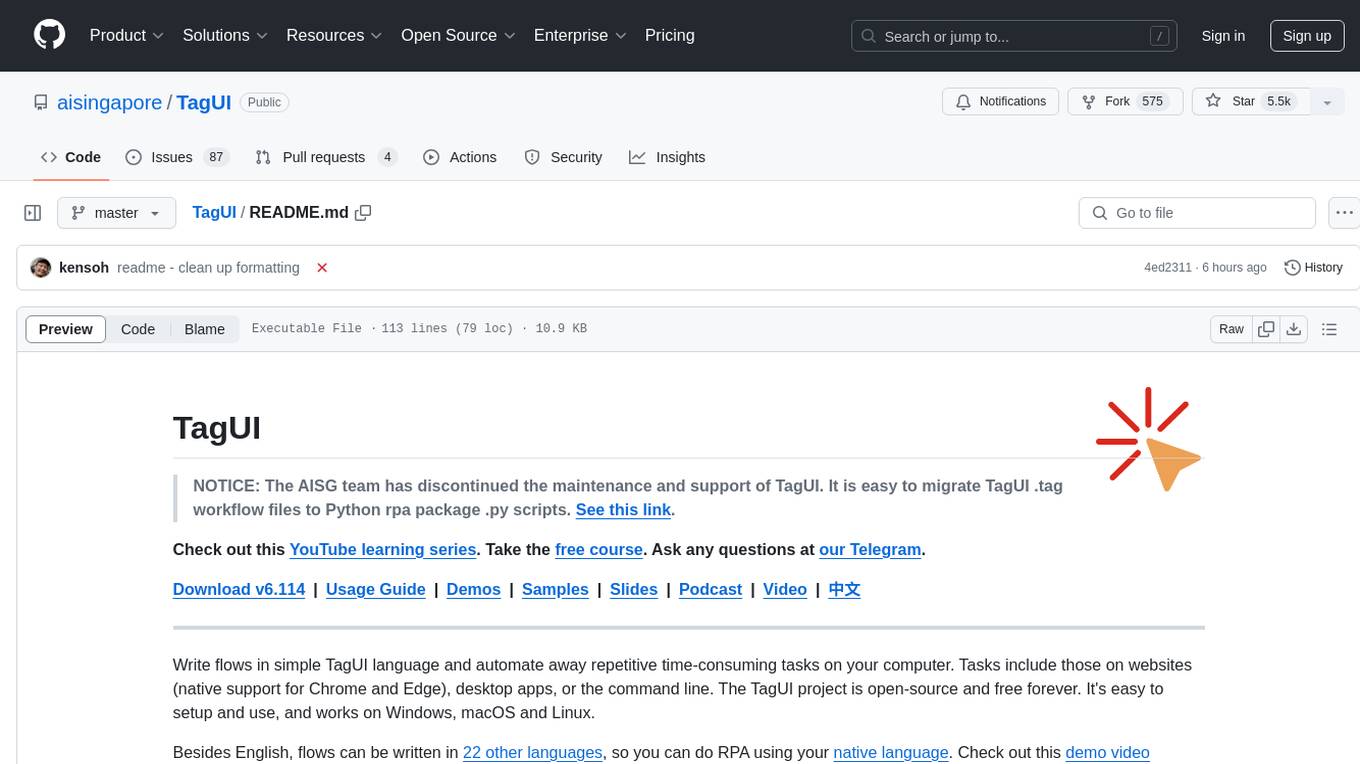
TagUI
TagUI is an open-source RPA tool that allows users to automate repetitive tasks on their computer, including tasks on websites, desktop apps, and the command line. It supports multiple languages and offers features like interacting with identifiers, automating data collection, moving data between TagUI and Excel, and sending Telegram notifications. Users can create RPA robots using MS Office Plug-ins or text editors, run TagUI on the cloud, and integrate with other RPA tools. TagUI prioritizes enterprise security by running on users' computers and not storing data. It offers detailed logs, enterprise installation guides, and support for centralised reporting.
For similar tasks

ResuLLMe
ResuLLMe is a prototype tool that uses Large Language Models (LLMs) to enhance résumés by tailoring them to help candidates avoid common mistakes while applying for jobs. It acts as a smart career advisor to check and improve résumés. The tool supports both OpenAI and Gemini, providing users with smarter, more accurate career guidance. Users can upload their CV as a PDF or Word Document, and ResuLLMe uses LLMs to improve the résumé following published guidelines, convert it to a JSON Resume format, and render it using LaTeX to generate an enhanced PDF resume.
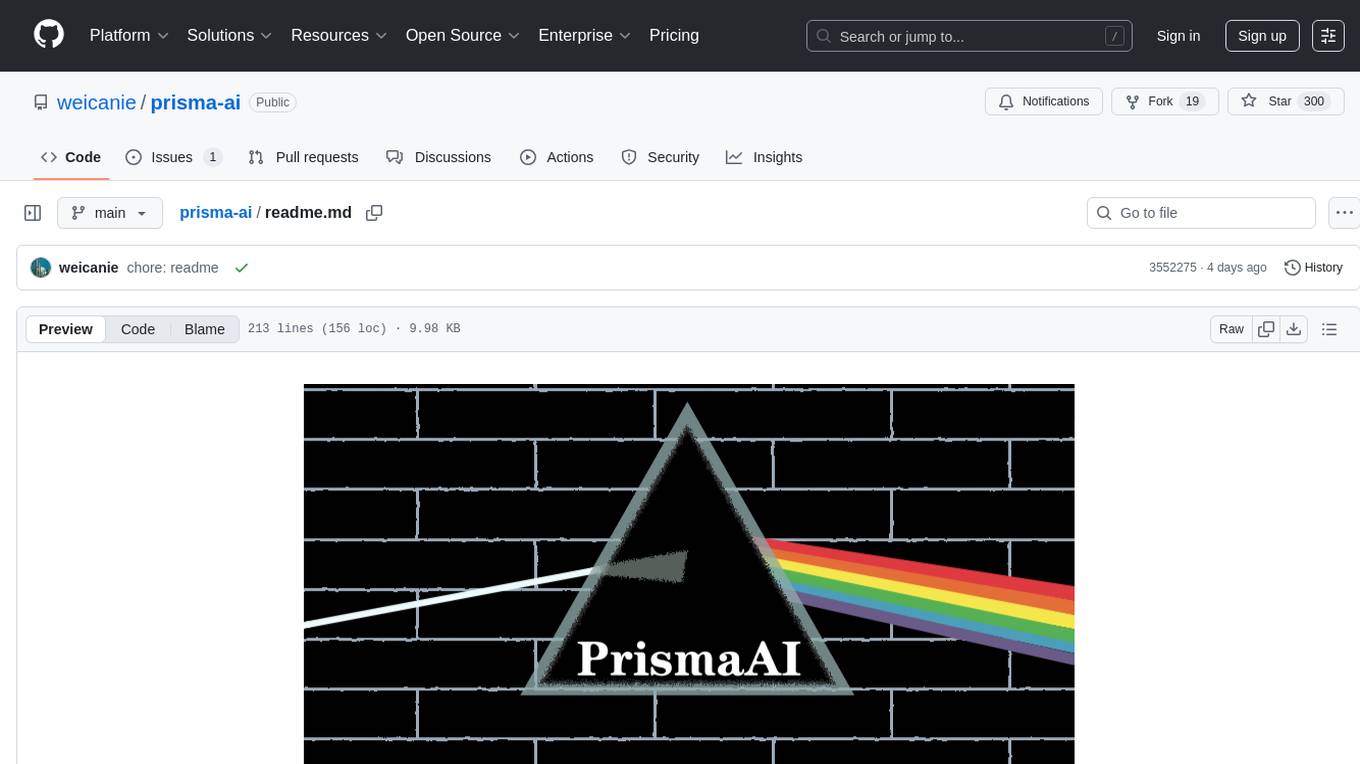
prisma-ai
Prisma-AI is an open-source tool designed to assist users in their job search process by addressing common challenges such as lack of project highlights, mismatched resumes, difficulty in learning, and lack of answers in interview experiences. The tool utilizes AI to analyze user experiences, generate actionable project highlights, customize resumes for specific job positions, provide study materials for efficient learning, and offer structured interview answers. It also features a user-friendly interface for easy deployment and supports continuous improvement through user feedback and collaboration.
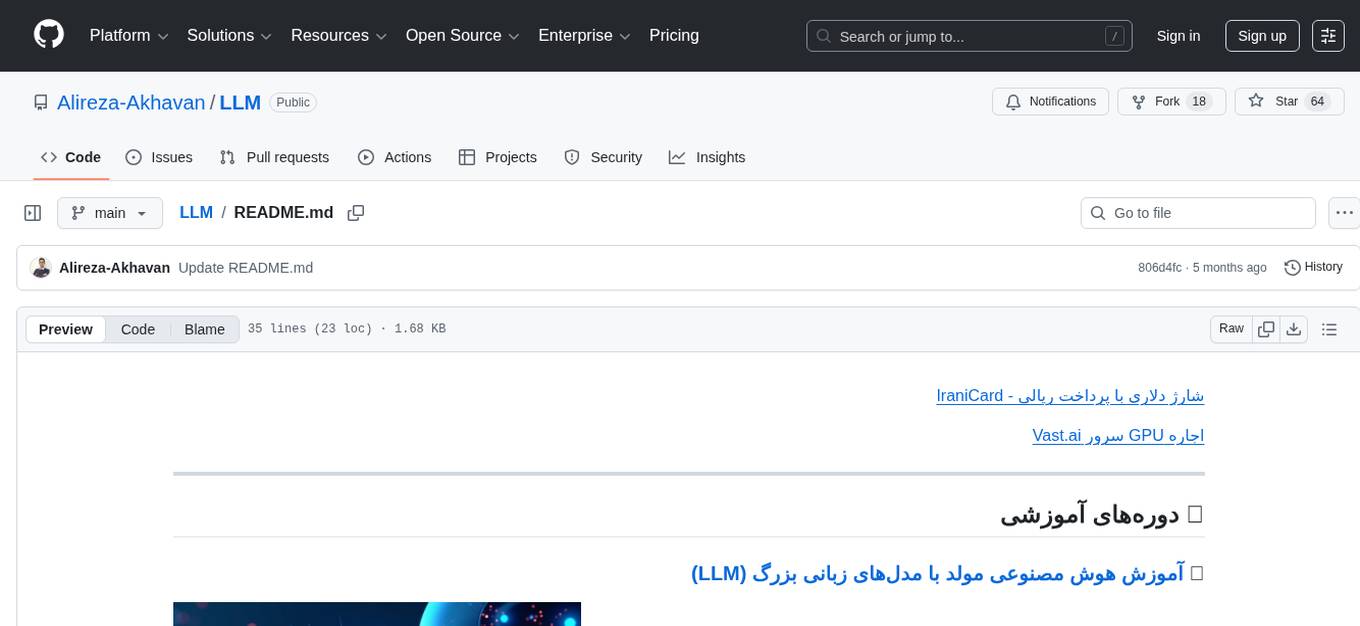
LLM
LLM is a repository focused on providing educational courses on artificial intelligence models, specifically focusing on language and image understanding. The courses are taught by Alireza Akhavan Pour and cover topics such as generative AI models and language-image understanding. The repository also includes information on how to contact the team through Telegram channels for course updates and Q&A sessions. Participants are encouraged to add their LLM or VLM course certificates to their LinkedIn profiles and tag Alireza Akhavan Pour for recognition and resume enhancement.
For similar jobs
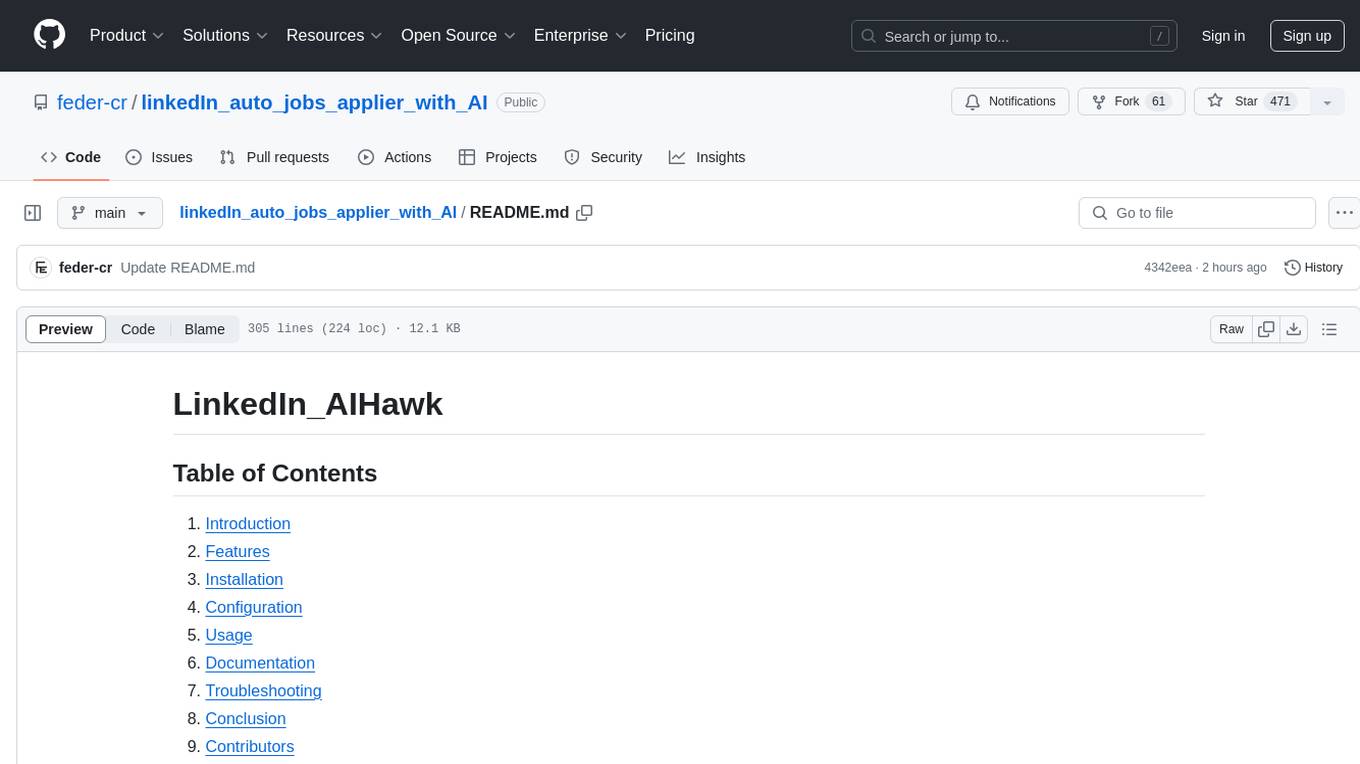
linkedIn_auto_jobs_applier_with_AI
LinkedIn_AIHawk is an automated tool designed to revolutionize the job search and application process on LinkedIn. It leverages automation and artificial intelligence to efficiently apply to relevant positions, personalize responses, manage application volume, filter listings, generate dynamic resumes, and handle sensitive information securely. The tool aims to save time, increase application relevance, and enhance job search effectiveness in today's competitive landscape.
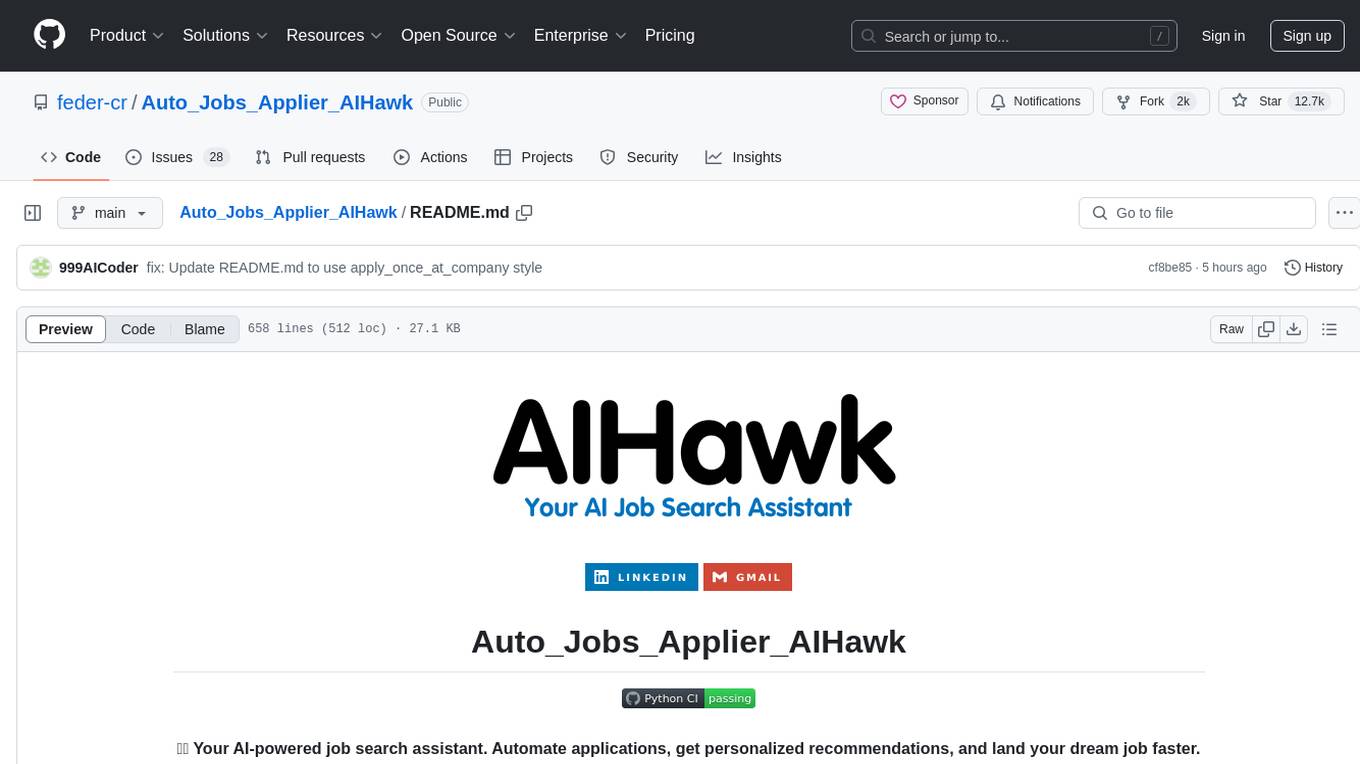
Auto_Jobs_Applier_AIHawk
Auto_Jobs_Applier_AIHawk is an AI-powered job search assistant that revolutionizes the job search and application process. It automates application submissions, provides personalized recommendations, and enhances the chances of landing a dream job. The tool offers features like intelligent job search automation, rapid application submission, AI-powered personalization, volume management with quality, intelligent filtering, dynamic resume generation, and secure data handling. It aims to address the challenges of modern job hunting by saving time, increasing efficiency, and improving application quality.

ResuLLMe
ResuLLMe is a prototype tool that uses Large Language Models (LLMs) to enhance résumés by tailoring them to help candidates avoid common mistakes while applying for jobs. It acts as a smart career advisor to check and improve résumés. The tool supports both OpenAI and Gemini, providing users with smarter, more accurate career guidance. Users can upload their CV as a PDF or Word Document, and ResuLLMe uses LLMs to improve the résumé following published guidelines, convert it to a JSON Resume format, and render it using LaTeX to generate an enhanced PDF resume.
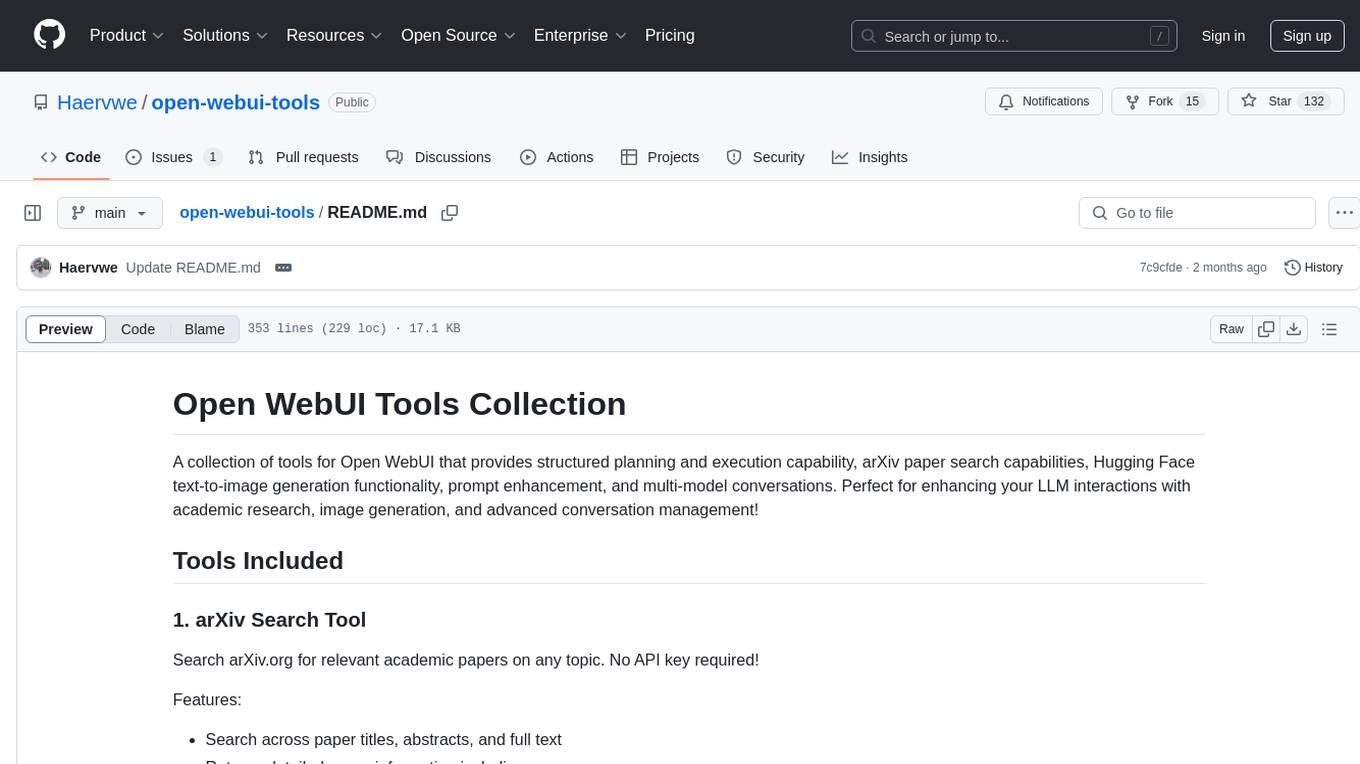
open-webui-tools
Open WebUI Tools Collection is a set of tools for structured planning, arXiv paper search, Hugging Face text-to-image generation, prompt enhancement, and multi-model conversations. It enhances LLM interactions with academic research, image generation, and conversation management. Tools include arXiv Search Tool and Hugging Face Image Generator. Function Pipes like Planner Agent offer autonomous plan generation and execution. Filters like Prompt Enhancer improve prompt quality. Installation and configuration instructions are provided for each tool and pipe.
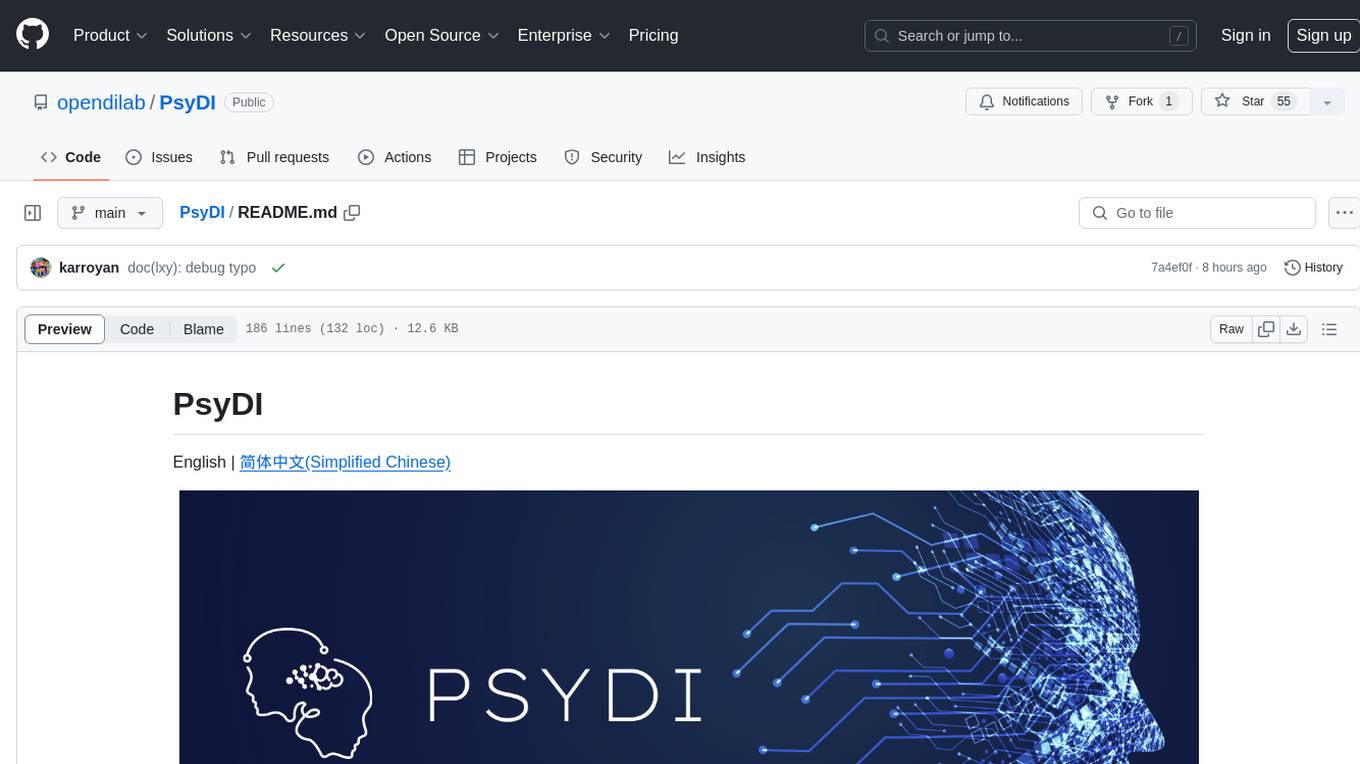
PsyDI
PsyDI is a multi-modal and interactive chatbot designed for psychological assessments. It aims to explore users' cognitive styles through interactive analysis of their inputs, ultimately determining their Myers-Briggs Type Indicator (MBTI). The chatbot offers customized feedback and detailed analysis for each user, with upcoming features such as an MBTI gallery. Users can access PsyDI directly online to begin their journey of self-discovery.
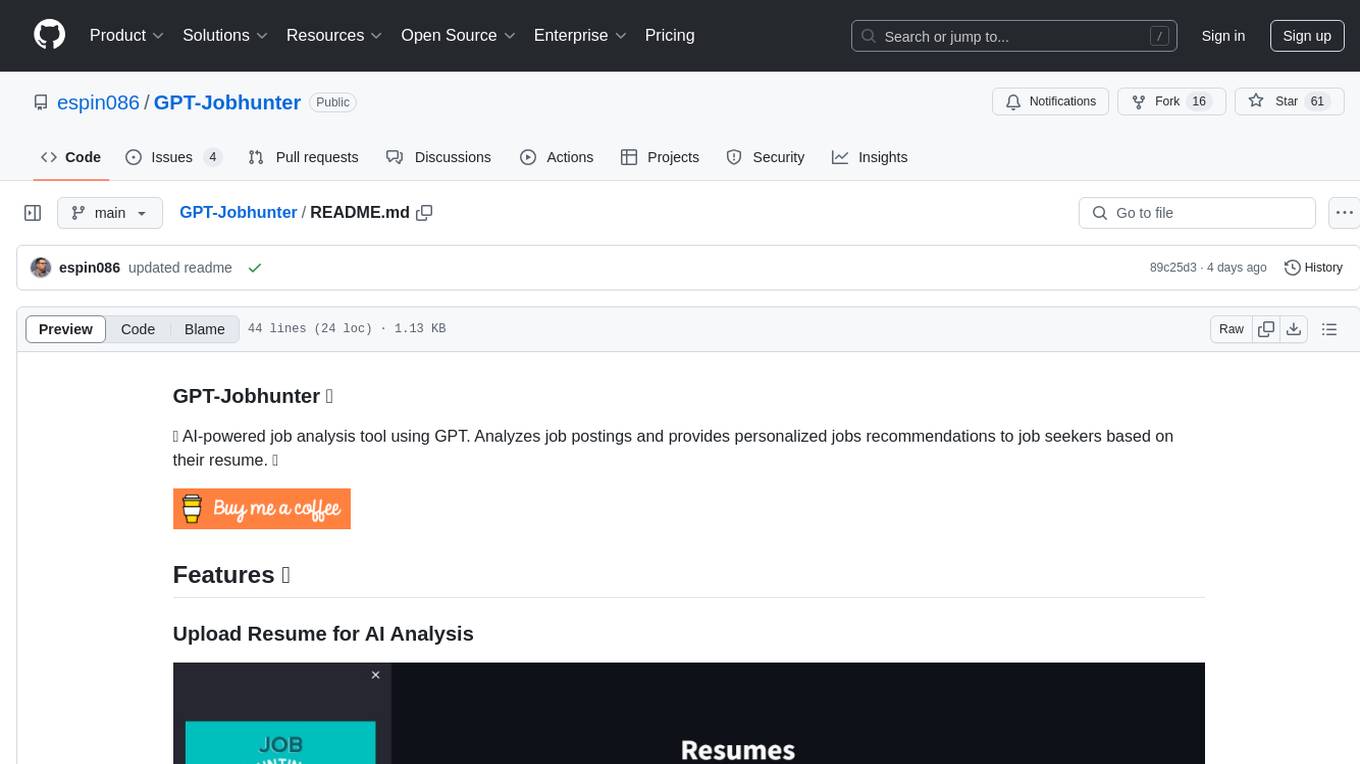
GPT-Jobhunter
GPT-Jobhunter is an AI-powered job analysis tool that utilizes GPT to analyze job postings and offer personalized job recommendations to job seekers based on their resume. The tool allows users to upload their resume for AI analysis, conduct highly configurable job searches, and automate the job search pipeline. It also provides AI-based job-to-resume similarity scores to help users find suitable job opportunities.
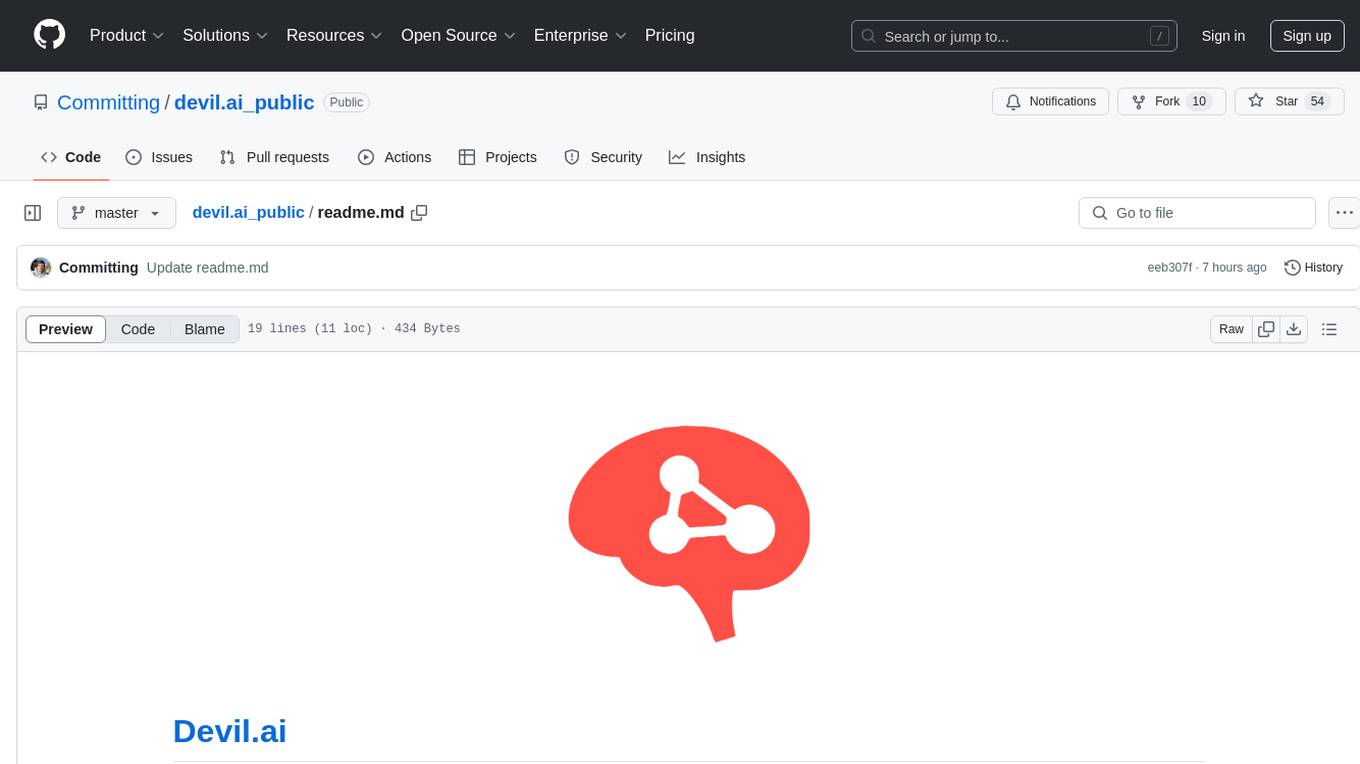
devil.ai_public
Devil.ai is a repository containing logic and data files for determining personality results. It includes classes for extended logic and calculation data related to MBTI personality types. The repository is licensed under MIT.
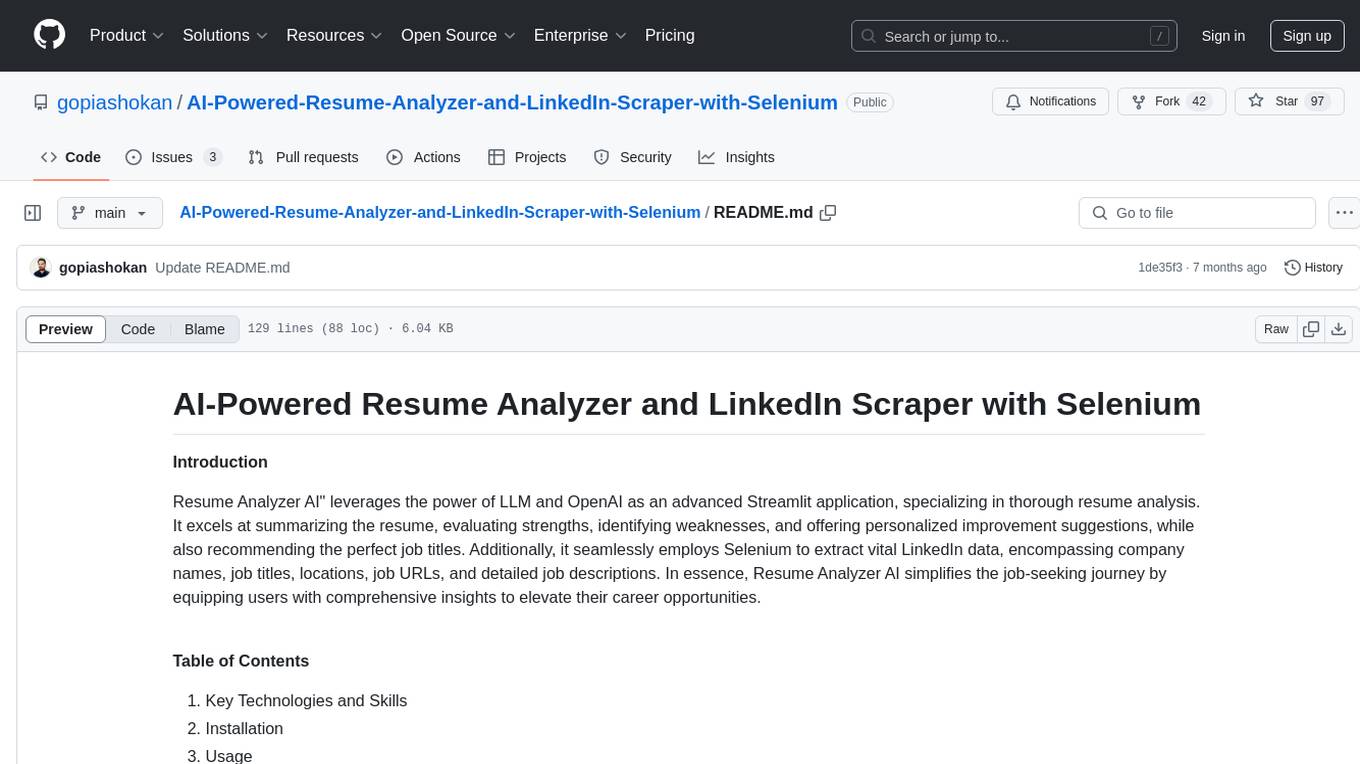
AI-Powered-Resume-Analyzer-and-LinkedIn-Scraper-with-Selenium
Resume Analyzer AI is an advanced Streamlit application that specializes in thorough resume analysis. It excels at summarizing resumes, evaluating strengths, identifying weaknesses, and offering personalized improvement suggestions. It also recommends job titles and uses Selenium to extract vital LinkedIn data. The tool simplifies the job-seeking journey by providing comprehensive insights to elevate career opportunities.



